How Do You Shoot Fashion E-commerce During a Pandemic?
Brand are tapping influencers, friends and employees to photograph new items at home, with some founders even turning their cameras on themselves.
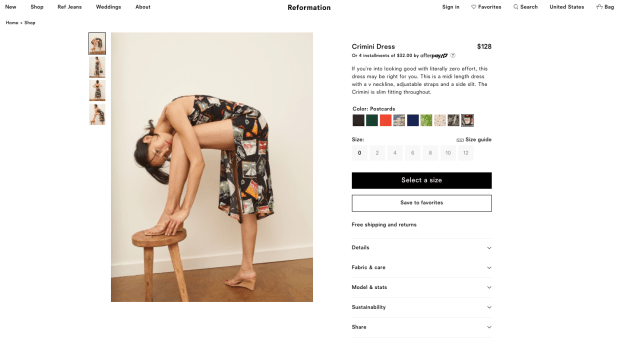
As we continue to stay home, consumers are increasingly relying on online shopping to purchase their necessities, or maybe even just to pass the time. E-commerce sales are actually up in the U.S., and although apparel sales aren't as strong as other categories at the moment, fashion brands are still putting all their efforts on digital channels now that their customers can't shop in stores.
Some retailers — namely those who hadn't photographed all of their collections on-model before lockdown orders were put in place — have found themselves in a bit of a pickle. Of course, in today's digitally-connected times, all they've had to do is get creative.
Reformation, known for its cool-girl flowy dresses, sent a few of its pieces to some of Instagram's coolest girls, effectively hiring influencers as e-commerce models. "We typically do our photo shoots in our in-house photo studio in Los Angeles or somewhere outdoors. Following the Safer at Home order in California, we knew we had to find a creative way to safely photograph product that still felt like us," explains Yael Aflalo, the brand's L.A.-based founder, via email. "It was a natural pivot to have our friends shoot themselves at home. It's important that we take care of each other during this time and this is a fun, new way to interact with the Ref community."
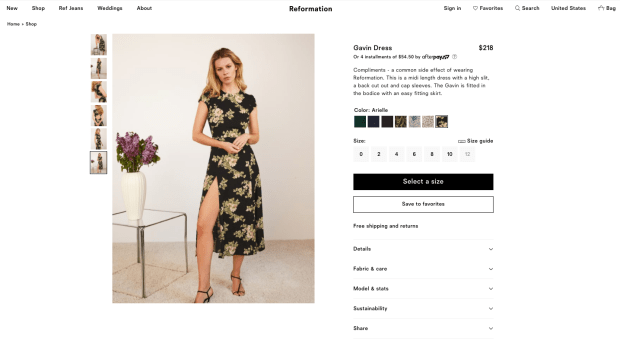
So far, Ref has tapped several women including Christie Tyler (a.k.a. NYC Bambi), Rachel Nguyen, Alyssa Vigueras and Chloe Hayward to shoot product at home. The brand will send the items to them directly. It will include a few styling pieces in the shipment as well, though some girls will mix in their own, says Aflalo. "We also send general direction with images we are inspired by, but we selected our partners based on their style and aesthetic so we are open to their creative input and direction." Reformation plans to continue working this way until L.A.'s restrictions are lifted.
Related Articles
Global Retail Platforms Are Making it Easier to Support Small, Local Boutiques Right Now
Fashion Influencers Are Navigating What Content Looks Like During a Pandemic
Could the Pandemic Push Influencer Marketing Deeper Into the Realm of CGI Avatars?
Similarly to Reformation, Free People tapped into its network of influencers to beef up its e-commerce listings and present product in a real-life context, even if real-life doesn't currently involve leaving the house.
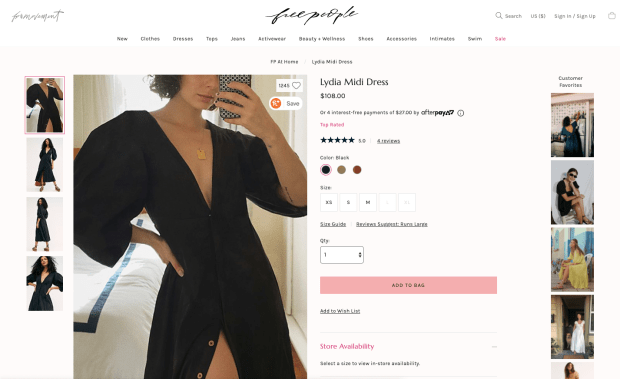
While many retail businesses of similar sizes might shoot all of their imagery in advance, Free People photographs much of its e-commerce and social media content right before it goes live, a rep for the brand tells us. And even without a pandemic, the brand regularly partners with influencers to whom it seeds product, then re-shares their images on its own social media platforms. Today, it's ramping that practice up using hashtags like #FPatHome and #DressedinFP, and even including that imagery on e-commerce listings. See, for instance, influencer Alyssa Coscarelli modeling this midi dress.
"During this time it feels organic to collaborate with our partners in deeper ways by incorporating their images on our product pages, emails etc. for the customer to see," Courtney Wartman, FP's Director of Brand Marketing, tells Fashionista.
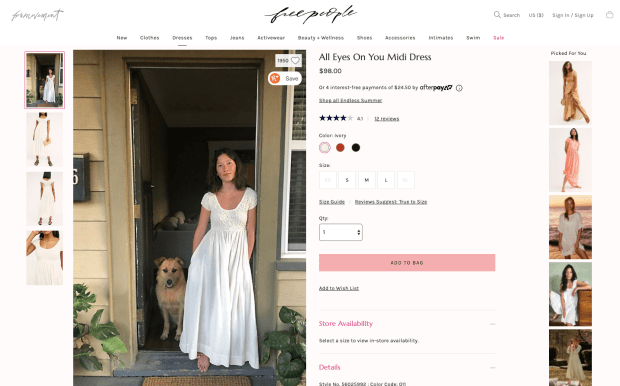
In addition to influencers, the URBN-owned retailer has also turned to its own employees to model product from home. While Kim, a buyer, and Nikki from design may not have hundreds of thousands of followers to share their looks with, their self-created imagery can still really resonate with shoppers. (Bonus: They're already on payroll.)
"During this time when we're a bit limited with resources, it has been a huge opportunity to extend our relationships with employees and partners," adds Wartman. "Our customer likes to see product in real-life situations and right now that's definitely been in the comfort of the person's home."
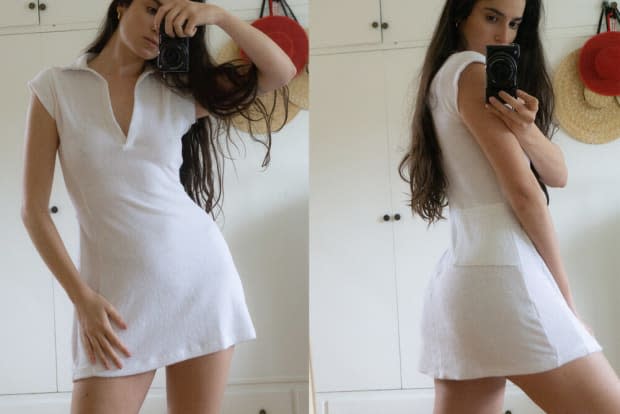
When you're a smaller brand without a lot of employees, one option is to take matters into your own hands. Eliana Gil Rodriguez, who launched her line of comfy, elevated basics, Gil Rodriguez, last year, is one example: When she launched her latest collection - a spring-y capsule of pieces made from terry cloth — she decided to turn the (iPhone) camera on herself. Luckily, Rodriguez has done a fair bit of e-commerce modeling in the past for brands like American Apparel and Outdoor Voices.
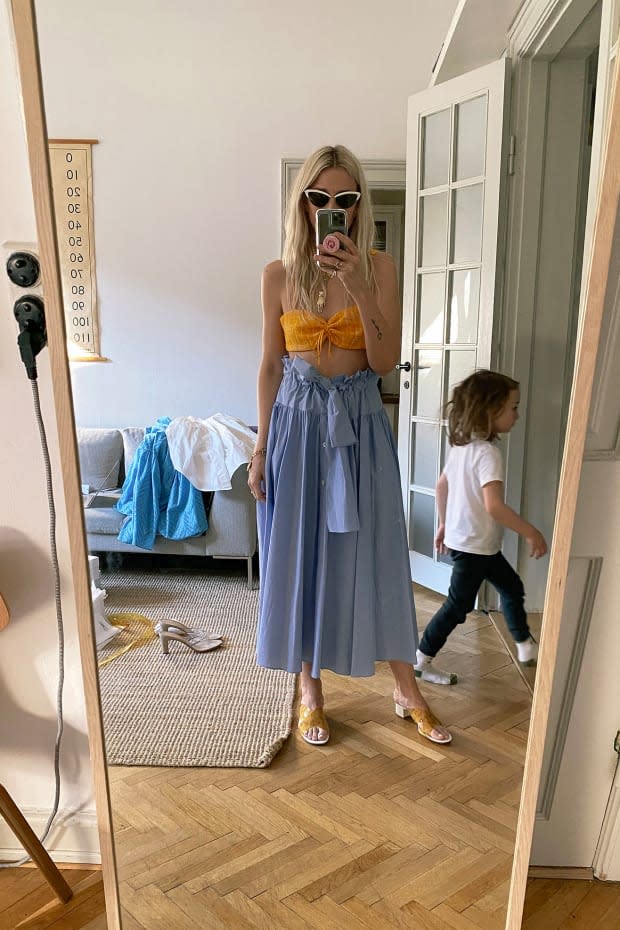
Casey Larkin Blonde, founder of Danish- and U.S.-based retailer and womenswear brand Mr Larkin, also went this route. "During the time we were in lockdown I shot items on myself in my home with my iPhone — kids, a little mess and all," she tells Fashionista. "We felt it was important to capture this moment in time in our imagery. Fortunately, Copenhagen has now opened again, but to stay extra safe, we're shooting with a small team outdoors."
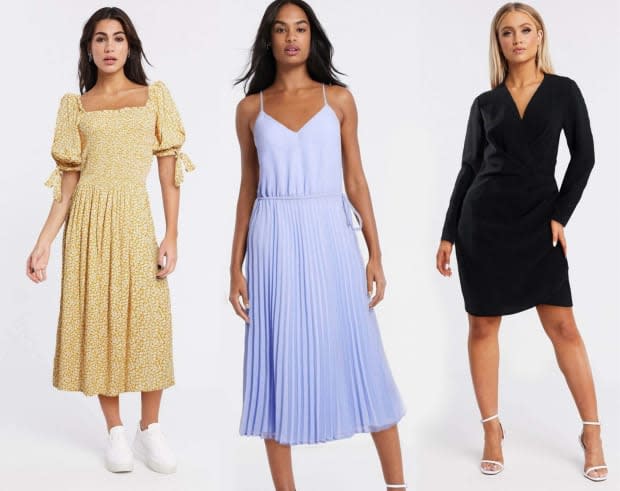
Meanwhile ASOS, a fast-fashion giant that likely still has substantial resources, has been tackling e-commerce imagery in a few different ways, one of which eschews the need for human models altogether. Since the UK-based retailer stopped bringing models into its studio due to the pandemic, it debuted a new AR technology powered by Zeekit on its product pages, where shoppers can see a "simulated" view of models wearing items. The brand says it's digitally fitting six models in up to 500 products per week.
"By digital mapping each product onto the model in a realistic way, taking account of the size, cut and fit of each garment, the technology ensures product presentation remains as realistic and engaging as possible while supporting social distancing," according to a rep for ASOS. According to Vogue Business, several other retailers are experimenting with this technology as well.
Don't worry though, ASOS hasn't abandoned human modeling altogether. It also sent product to influencers and models for them to shoot from home; those images are used to supplement items shot on-hanger, as seen below.
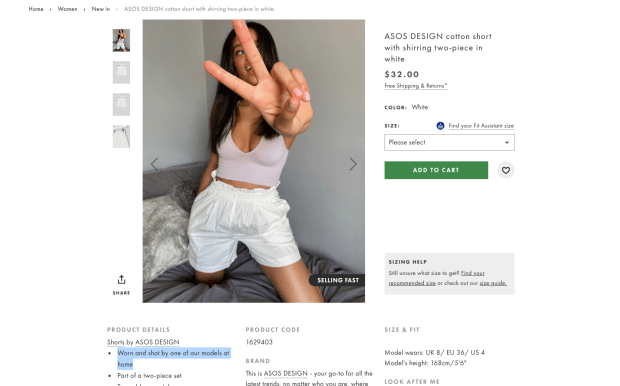
What remains to be seen is how much all this creative pivoting will change e-commerce photography even after this is all over. Will brands do away with hiring photographers, makeup artists, hairstylists, retouchers and even models upon realizing they don't absolutely have to do so? Or could this fundamentally change the way brands work with influencers and their own employees. As we keep hearing again and again, this new normal isn't going to come to an abrupt end when the lockdowns do.
Never miss the latest fashion industry news. Sign up for the Fashionista daily newsletter.